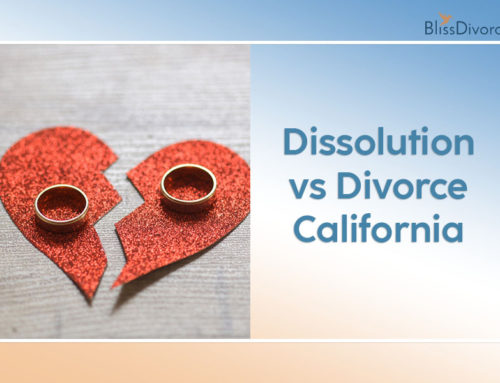Going through a divorce is a big change. An even bigger change is what the married couple decides to do with their current home. In the state of California, there are set laws to help determine who gets the house in California divorce. Finding out who wins in a property dispute leaves couples overwhelmed to learn that there isn’t a straightforward answer.
The process can go in two ways – the couple can decide on the terms just between themselves or let the court decide for them. Having somebody else decide is never the best option since you may regret it. Coming to an agreement with the other half is likely the best option. If you cannot reach a resolution, you will need a consultation with a lawyer or divorce mediator.

Source: shutterstock.com / Photo Contributor: True Touch Lifestyle
Who Gets the House in California Divorce?
In order to answer the question above, what needs to be explained is how the process of the house being granted to one spouse happens. Two choices are given – consented or unconsented divorce.
This means the spouses can agree among themselves or leave the decision up to a judge.
One can choose to go forward based on their terms which can be decided by discussing what is best with your spouse, by consulting a lawyer, or by looking into online divorce mediation service.
If the choice is to be made by the court, it will follow California Divorce laws for community versus separate property.
The house is similar to all assets and will be divided based on community or separate property. Under California law, community property is property acquired during the marriage while domiciled in California. Separate property, on the other hand, is property owned prior to the marriage, or received during the marriage as a gift or inheritance.
This determination for the house as a community or separate property is a critical first step. There are also other factors like each spouse’s financial status and, if applicable, what is in the best interest of the minor children. minor children are involved. So, who gets the house?
From a legal standpoint, what belongs to you and what belongs to your spouse, and what belongs to both of you to split in the divorce will be determined using the concept of community and separate property in California.
You and your spouse can keep this in mind and work together to determine what is best for you and your family and stay out of court, or you can hire attorneys and have the judge decide for you.
What Kind of Property Is Your House Characterized As?
In a state that follows community property law for divorce, the property can fall into one of two categories – community property or separate property.
A house is considered community property when the property has been purchased after marriage or if the names on the lease are of both spouses. Even if the house belongs to one spouse, if the other one contributed to paying taxes and mortgage, the house is community property.
Separate property can be considered if the house has belonged to one spouse before marriage or if their name is on the legal documents. If the person has received the house as a gift or as an inheritance, the house belongs solely to them.

Source: shutterstock.com / Photo Contributor: Ground Picture
Property Division Laws in California
California’s Family Code Section 2581 explains how the state automatically presumes that the house in question is community property. This is due to the fact that when two people legally bond themselves through marriage, they form a community of their own.
This same law applies to all assets, debts, and anything material or non-material from a financial aspect that the couple has.
In California, the property acquired by either spouse during the marriage is presumed to be community property, meaning it is equally owned by both spouses. Community property laws assume a 50/50 split of the value of the assets.
While the couple can not outright divide a house in two, they can divide the worth of the asset equally. For example, one spouse may need to buy out the other, or they can sell the house, with each of them getting a share of the proceeds.
If the couple can not work together to divide the worth of the property according to community property law, they can go to court and have the judge divide everything equally between them.
Nonetheless, there are a few scenarios in which the equal split may not apply. If the property is judged to be separate property, it goes to the individual who owns it.
Division of Community Property Between Spouses
It is best for a couple to reach an agreement on their own to save time, attorney fees and to avoid court appearances. However, if the couple goes to court, a judge will decide for them. State laws requires an even split between the partners.
Although the judge will consider all aspects of each case, the division is most likely based on community vs. separate property laws.
Here are the options a judge may choose:
Selling the home and dividing profits
The spouses are required to sell the house and divide all profits equally. This is usually the first option the court takes when one spouse cannot afford the costs of the property alone.

Source: shutterstock.com / Photo Contributor: Andrey_Popov
To buy out the other party
One spouse can ask to buy out the other. This means that the spouse who wants the entire property must pay the other for their share of the house. This is allowed by the court after looking into whether one person can handle all the expenses that come with the house, including property taxes, mortgage payments, and maintenance and up keep.
Deferring sale
When minor children are involved, the court decides upon a deferring sale. This is to minimize the effect of the divorce on the children. This allows both spouses to own the house, but one has the privilege to continue living in the home in the interest of the children.
When deciding upon such a case, all aspects of the children’s lives are looked into.
From social relationships to their health conditions to their school grades. The court then follows the case until it is decided that the spouses can sell the house and divide the profits.
Reimbursement
There is more than one way a spouse may have to reimburse the other. Reimbursements are required when a home was separate property before marriage, but after legal binding, the other spouse helped out with the costs (taxes, mortgage, up-keeping).
If this is the case, the spouse that owns the house gives back all of the money the other one spent on their home.

Source: shutterstock.com / Photo Contributor: fizkes
“Watts and Epstein Charges’’
Watts and Epstein credits or charges refer to reimbursements due at the property division. For example, if the couple owns a family home, and one spouse vacates, leaving the other spouse there to pay the mortgage (or if the one vacates but still pays the mortgage while the other lives there), the one who vacates may be due reimbursements.
Similar to a reimbursement deal, when one spouse gets the privilege to own the house, they are required to pay the other spouse rental money for their stay at the family home. As the other one moves out, the spouse who stays pays off the house to the other.
The reimbursement is made to fund the expenses of the spouse that moves out since they will need to find a place of their own.
*This article is for informational purposes only and is not intended to provide legal advice. If you require legal advice, please contact a licensed attorney in your local area.




